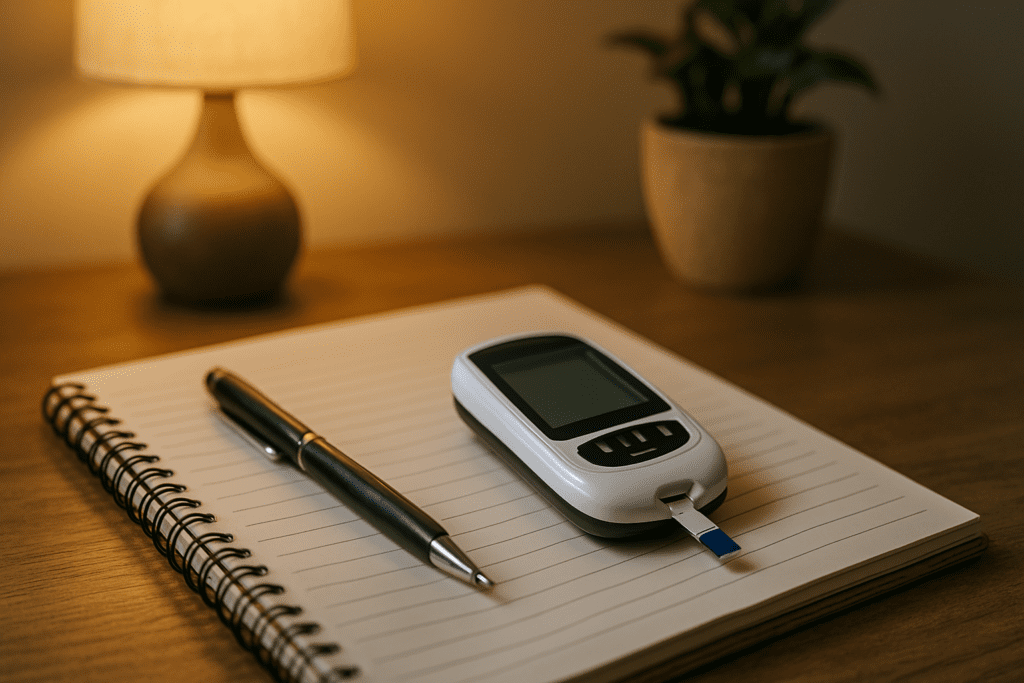Feeling dizzy can be a disorienting experience, especially when it arises without warning or an obvious cause. For individuals managing diabetes or those concerned about their metabolic health, one pressing question often surfaces: can high blood sugar make you dizzy? The answer is more complex than a simple yes or no. Dizziness and lightheadedness can occur as a result of several physiological changes in the body, many of which are directly influenced by fluctuations in blood glucose levels. Understanding how blood sugar impacts equilibrium and neurological function can offer crucial insights into not just the symptoms, but also the mechanisms and interventions that matter most.
You may also like: How Diabetes Affects the Brain: Understanding Brain Fog, Memory Loss, and Mental Confusion from High Blood Sugar
This article delves into the science of how glucose interacts with bodily systems, explores the causes and manifestations of dizziness related to hyperglycemia, and offers evidence-based guidance on when to seek help. Whether you’re newly diagnosed with diabetes, managing type 1 or type 2 diabetes, or simply trying to understand why you feel dizzy after meals, the science presented here will help illuminate the path forward. We’ll explore the roles of insulin, dehydration, autonomic dysfunction, cerebral glucose delivery, and more, all within the framework of the latest research and clinical practice.

The Physiological Link Between Blood Sugar and Dizziness
To answer the question, does high blood sugar make you dizzy, we need to first understand how blood glucose functions within the body. Glucose is the primary fuel for cellular activity, particularly in the brain. The brain does not store glucose and depends on a continuous supply via the bloodstream. When blood sugar levels rise significantly—a condition known as hyperglycemia—it can disrupt fluid balance, nerve signaling, and vascular tone, all of which contribute to symptoms like dizziness.
One core mechanism involves osmotic diuresis. When blood sugar rises beyond the renal threshold (generally above 180 mg/dL), the kidneys begin to excrete excess glucose through the urine. This process pulls water along with it, leading to dehydration. Dehydration, in turn, decreases blood volume and reduces cerebral perfusion, potentially resulting in sensations of lightheadedness, especially upon standing. In this context, it becomes clear why can diabetes cause dizziness is not just a rhetorical question but a meaningful inquiry into homeostatic disruption.
Furthermore, high blood sugar can affect the autonomic nervous system, which regulates involuntary functions like heart rate and blood pressure. Chronic hyperglycemia can damage the small nerves involved in these regulatory processes—a condition known as autonomic neuropathy. As this neuropathy progresses, it can interfere with the body’s ability to maintain stable blood pressure during positional changes, contributing to dizziness or even syncope (fainting). Thus, diabetes dizziness is often tied not just to momentary spikes in blood glucose, but to long-term systemic effects.
Hyperglycemia-Induced Dehydration and Vascular Instability
One of the most immediate ways high blood sugar causes dizziness is through its dehydrating effect. When we ask, can high blood sugar cause lightheadedness, the answer is almost invariably linked to this loss of fluid and electrolytes. Dehydration alone can lower blood pressure, increase heart rate, and reduce the brain’s oxygen supply, all of which create the conditions for feeling faint or off-balance.
Electrolyte imbalances add another layer of complexity. Potassium, sodium, and magnesium levels are often depleted in cases of persistent hyperglycemia. These electrolytes are critical for neuromuscular function, and imbalances can impair the brain’s ability to process sensory information or regulate coordination. In some cases, people with poorly managed diabetes may feel as though they are “floating” or experiencing vertigo, sensations that are often dismissed as anxiety but may in fact be rooted in glucose-related changes.
The vascular system is also under stress during periods of high blood sugar. Glucose can damage the endothelial lining of blood vessels, impairing their ability to constrict and dilate appropriately. As a result, blood flow becomes erratic, particularly during transitions from lying down to standing. If you’ve ever wondered, can high sugar levels make you dizzy, it is in part due to this compromised vascular reactivity. The inability of blood vessels to properly adapt can create momentary drops in cerebral blood flow, producing dizziness or even blurred vision.
Neurological Responses to Elevated Blood Sugar
The brain is exquisitely sensitive to changes in glucose levels. Even mild deviations from normal can impair cognitive function and spatial orientation. In extreme cases, very high blood sugar levels—typically above 600 mg/dL—can lead to a life-threatening condition known as hyperosmolar hyperglycemic state (HHS). One of the hallmark symptoms of HHS is profound confusion and dizziness, often progressing to stupor or coma if left untreated. While HHS is rare and usually occurs in older adults with type 2 diabetes, it starkly illustrates the potential danger of untreated hyperglycemia.
On a more moderate level, dizziness in diabetes can arise from fluctuating glucose levels that stress the brain’s ability to maintain homeostasis. These fluctuations often occur postprandially (after eating), particularly if the meal contains a high glycemic load. This can result in a sudden spike followed by a rapid drop, both of which may leave a person feeling disoriented. This is one reason why some people report feeling lightheaded after sugary snacks or high-carb meals, prompting the question, can too much sugar make you dizzy? Yes, especially when it disrupts the brain’s normal fuel supply and triggers reactive insulin responses.
The question does diabetes make you dizzy should also be examined in the context of comorbid conditions. Many people with diabetes also have high blood pressure, cardiovascular disease, or take medications that influence glucose metabolism or fluid balance. These overlapping factors create a constellation of risk that can make it difficult to pinpoint a single cause of dizziness but underscores the importance of comprehensive medical evaluation.
Type 1 Diabetes and the Unique Challenges of Dizziness
In individuals with type 1 diabetes, dizziness can manifest for reasons beyond high glucose alone. Insulin dosing, physical activity, and dietary intake must all be precisely balanced to maintain normoglycemia. When this balance is disrupted, both hypoglycemia and hyperglycemia become real threats, and both can lead to lightheadedness. Therefore, when someone asks, is it normal to feel dizzy with type 1 diabetes, the answer often lies in the context of their daily glucose management.
Dizziness in type 1 diabetes may also be an early sign of a condition called gastroparesis, where high blood sugar levels affect the nerves controlling the stomach muscles, slowing digestion. This delay can make insulin timing more difficult and result in unpredictable glucose swings, increasing the risk of dizziness. Moreover, autoimmune conditions such as Addison’s disease or thyroid dysfunction—more common in people with type 1 diabetes—can independently contribute to symptoms of dizziness, further complicating diagnosis.
It’s also worth noting that emotional stress and physical fatigue, which are often intensified in chronic illness, can amplify the sensation of dizziness even when glucose levels are within normal ranges. In these cases, does high glucose cause dizziness may not fully capture the lived experience, but it remains an important question for guiding clinical investigation and self-monitoring strategies.
How to Respond: What to Do If a Diabetic Feels Dizzy
Recognizing dizziness as a potential symptom of dysregulated blood sugar is the first step. But knowing what to do if a diabetic feels dizzy is equally essential. First, it’s important to determine whether the dizziness is accompanied by other symptoms such as palpitations, sweating, nausea, confusion, or visual disturbances. These can offer clues as to whether the underlying cause is hyperglycemia, hypoglycemia, dehydration, or another issue entirely.
Immediate steps should include checking blood glucose levels. If blood sugar is elevated (typically above 180 mg/dL), hydration becomes a priority. Drinking water can help lower blood sugar levels and combat dehydration. If the individual is experiencing persistent vomiting, confusion, or chest pain, emergency care should be sought immediately, as these may signal diabetic ketoacidosis (DKA) or another serious complication. If glucose is low (below 70 mg/dL), quick-acting carbohydrates like juice or glucose tablets are recommended.
For those with frequent or unexplained episodes, medical consultation is essential. A healthcare provider can assess for underlying causes such as medication side effects, autonomic neuropathy, or even inner ear dysfunctions that may coexist with diabetes. Adjustments in medication, diet, and physical activity may be necessary to restore balance. Understanding that can hyperglycemia cause dizziness is not just a theoretical concern but a practical reality can empower patients to take proactive steps toward managing their health.
When to Seek Medical Help for Dizziness and Diabetes
While occasional lightheadedness may be benign, certain patterns warrant medical attention. If dizziness is recurrent, occurs with positional changes, or is accompanied by fainting, it could suggest a more serious underlying issue such as orthostatic hypotension or cardiovascular disease. In such cases, asking does diabetes cause dizziness becomes a gateway to deeper diagnostic inquiry.
Similarly, dizziness paired with vomiting, rapid breathing, or mental confusion may indicate DKA, especially in individuals with type 1 diabetes. In older adults with type 2 diabetes, these symptoms may point toward HHS, which also requires immediate hospitalization. Even absent these severe syndromes, chronic dizziness can significantly impair quality of life, increasing fall risk and complicating diabetes management. Therefore, addressing the root cause is not just about comfort, but about preventing long-term complications.
People experiencing dizziness should keep a symptom diary, noting the time of day, glucose readings, meals, medications, and physical activity. This information can be invaluable to healthcare providers and may reveal trends that are not immediately obvious. For example, someone might discover that their morning insulin dose is too high relative to their breakfast, causing mid-morning hypoglycemia and resultant dizziness.

Frequently Asked Questions: Dizziness and High Blood Sugar
1. Can high blood sugar cause lightheadedness during daily activities like driving or walking?
Yes, high blood sugar can cause lightheadedness in subtle but risky ways, especially during activities requiring focus or balance. This sensation may stem from dehydration due to osmotic diuresis, where excess glucose draws water out of your cells. People often overlook how chronic hyperglycemia affects the vestibular system and cerebral blood flow, both of which are crucial for spatial orientation. If you’ve ever felt slightly off-kilter behind the wheel, it’s worth asking: can high blood sugar make you dizzy in real-world settings? Repeated episodes of diabetes light headed spells in these scenarios can indicate unstable glucose management and should not be ignored.
2. Does high blood sugar make you dizzy even if you’re not diabetic?
Absolutely—temporary hyperglycemia from overeating, stress, or illness can affect anyone. You don’t need a diabetes diagnosis to feel the effects. For example, a person consuming a very high-carb meal might experience a postprandial glucose spike, leading to symptoms like high blood sugar dizzy spells, even if their fasting levels are normal. So, while diabetes dizziness is often associated with chronic conditions, transient elevations in glucose can also lead to questions like: can too much sugar make you dizzy? The answer is yes, especially when sugar intake significantly exceeds your body’s insulin response.
3. What to do if a diabetic feels dizzy suddenly and isn’t sure why?
When assessing what to do if a diabetic feels dizzy, the first step is to check blood glucose levels immediately. Dizziness can result from either hyperglycemia or hypoglycemia, and acting without confirming can be dangerous. If readings are high, hydrate with water to flush excess glucose and consider light movement if safe. But if low, consuming fast-acting carbohydrates is crucial. Remember, can diabetes make you dizzy is not just a hypothetical—it’s a daily management challenge. Keeping a dizziness journal and updating your endocrinologist can also clarify whether you’re experiencing diabetes dizziness from medications, blood pressure changes, or food timing issues.
4. Can diabetes cause dizziness through long-term nerve or vascular damage?
Yes, chronic diabetes can cause dizziness due to autonomic neuropathy, a lesser-discussed but impactful complication. This condition affects the nerves regulating heart rate and blood pressure, leading to orthostatic hypotension—a sudden drop in pressure when standing up. This mechanism often explains high sugar dizziness episodes that occur even with controlled blood glucose. In such cases, one might ask: does diabetes make you dizzy, or is it the secondary damage? Both are true, and the dizziness may persist even after glucose stabilization, requiring lifestyle changes like slow posture shifts and increased electrolyte intake.
5. Is dizziness a sign of diabetes in undiagnosed individuals?
Dizziness can be one of several subtle signs of diabetes, particularly when paired with fatigue, frequent urination, or blurred vision. When patients ask, “is dizziness a sign of diabetes?”—it’s important to consider context. Sporadic dizziness might be due to dehydration or lack of sleep, but recurrent symptoms after meals could point to glucose regulation issues. Can high sugar cause dizziness in undiagnosed individuals? Yes, and tracking symptoms with a glucometer during symptomatic episodes can provide valuable insight before formal diagnosis. This is especially important in those with family history or other risk factors.
6. Can high glucose cause dizziness during exercise or after workouts?
Definitely. High-intensity workouts can trigger a paradoxical spike in blood glucose due to stress hormone release, particularly in people with insulin resistance or poorly managed diabetes. During or post-exercise, symptoms like lightheadedness, blurred vision, or nausea may make you wonder: can high glucose cause dizziness even during physical activity? Yes—and this is more common than many realize. For those asking, “does high glucose cause dizziness when I’m trying to be healthy?”—the answer may lie in your timing, hydration, or carbohydrate intake before workouts. A diabetes educator or exercise physiologist can help refine your approach.
7. Can too much sugar make you dizzy hours after eating?
Yes, particularly due to a rebound effect called reactive hyperglycemia. When people ask, “can too much sugar make you dizzy even later?” they’re often describing the aftermath of rapid insulin release, which causes glucose to crash below baseline. This pattern is more common in early type 2 diabetes or insulin resistance and may be misread as anxiety or fatigue. Understanding that high sugar dizziness doesn’t always happen immediately can help identify hidden glucose imbalances. Using a continuous glucose monitor (CGM) can be especially helpful to catch these post-meal fluctuations and guide dietary adjustments.
8. Is it normal for someone with type 1 diabetes to feel dizzy regularly?
While occasional dizziness can happen in type 1 diabetes, persistent episodes are not considered normal. If you’ve ever wondered, “is it type 1 diabetes normal to feel dizzy most days?” the answer is no. Chronic dizziness may signal complications such as dehydration, autonomic neuropathy, or blood pressure dysregulation. It could also reflect insulin dosing mismatches during exercise or missed snacks. Monitoring trends in when the dizziness occurs helps clarify whether you’re dealing with “can hyperglycemia cause dizziness” or are experiencing lows due to insulin peaks. In either case, it’s worth reviewing your treatment plan.
9. How does stress affect dizziness in diabetics with elevated blood sugar?
Stress raises cortisol and adrenaline, which in turn elevate blood sugar. Many people don’t realize that this can lead to overlapping symptoms like heart palpitations, blurry vision, and dizziness—prompting questions like: does diabetes cause dizziness, or is it anxiety? Often, it’s both. Stress-induced glucose spikes may cause symptoms that feel identical to those of anxiety, especially in newly diagnosed individuals. So when patients ask, “can high sugar levels make you dizzy if I’m already feeling stressed?” the answer is yes—and stress management becomes just as important as carb counting in preventing diabetes light headed episodes.
10. Are there emerging tools that can help manage high blood sugar dizziness more effectively?
Yes, advances in wearable tech and AI-driven health platforms offer new ways to monitor and predict dizziness linked to glucose fluctuations. Devices like CGMs now offer trend alerts, which can notify users before symptoms like high blood sugar make you dizzy. Algorithms that learn from personal data can help flag patterns leading to high blood sugar dizzy spells, enhancing early intervention. This proactive approach transforms care from reactive to preventative. For those wondering, “will diabetes make you dizzy forever?”—the answer is increasingly “not necessarily,” thanks to tech that allows more personalized glucose stability.

Conclusion: Recognizing High Blood Sugar Dizziness and Taking Action for Long-Term Health
So, can high blood sugar make you dizzy? Absolutely—but not in isolation. The sensation of dizziness arises from a complex interplay between hydration status, nerve function, vascular tone, cerebral glucose availability, and even psychological stress. While hyperglycemia is often the culprit, other coexisting conditions and factors can contribute. That’s why understanding the full scope of can diabetes make you dizzy or does high glucose cause dizziness matters so much. It informs not only personal health management but also guides timely medical intervention.
From a prevention standpoint, maintaining stable blood sugar levels through consistent meal planning, medication adherence, and regular exercise remains foundational. Equally important is staying hydrated and being attuned to symptoms that may indicate deeper issues such as autonomic neuropathy or cardiovascular dysfunction. The good news is that with the right information and support, dizziness doesn’t have to be a mystery—or a regular part of life with diabetes.
Ultimately, whether you’re wondering can high sugar cause dizziness or simply looking for answers about persistent lightheadedness, the key lies in comprehensive care. By treating the whole person—not just isolated symptoms—we can move toward better outcomes, greater comfort, and a more empowered approach to diabetes management.
diabetes-related balance issues, how dehydration impacts glucose regulation, signs of blood sugar imbalance, cerebral perfusion and blood sugar, autonomic dysfunction in diabetes, diabetic neuropathy and dizziness, postprandial glucose effects, diabetic complications and equilibrium, dizziness after eating sugar, hypoglycemia vs hyperglycemia symptoms, blood sugar and cardiovascular symptoms, glucose brain function disruption, endocrine health and dizziness, diabetes and vascular reactivity, dizziness in older adults with diabetes, diabetes and electrolyte balance, managing blood sugar naturally, when to worry about dizziness, diabetes emergency signs, diabetic dizziness treatment
Further Reading:
Can High Blood Sugar Cause Dizziness?
Ways type 2 diabetes can cause dizziness
Correlation between dizziness and impaired glucose metabolism
Disclaimer: The content published on Better Nutrition News (https://betternutritionnews.com) is for informational and educational purposes only. It is not intended as a substitute for professional medical advice, diagnosis, or treatment. Always seek the guidance of a qualified healthcare professional before making any changes to your diet, nutrition, or wellness practices. The opinions expressed by authors and contributors are their own and do not necessarily reflect those of Better Nutrition News.
Better Nutrition News and its affiliates make no representations or warranties regarding the accuracy, completeness, or reliability of the information provided. We disclaim all liability for any loss, injury, or damage resulting from the use or reliance on the content published on this site. External links are provided for reference purposes only and do not imply endorsement.



